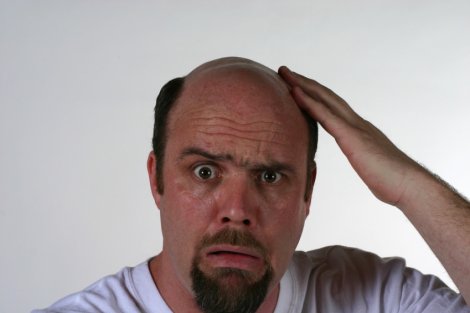Six Reasons for Hair Loss by Howard Levy

Dr. Howard Levy, M.D. has published an article on hair loss in the Johns Hopkins magazine which explains that there are six main reasons why people lose hair. Although usually people talk about the end result, he says that hair loss can be prevented if it is studied in the very early stages.
As a rule balding people are 40 and older, but without any special signs the pattern baldness might start as early as in teenage years. Hair loss happens to both men and women and while for men it is usually not a matter of concern, women panic and try to hide it or find a cure. Dr. Levy says there are not many reasons to look at, so, everybody should see if hair loss will become a problem for them before it really starts.
Reason 1. Normal variation.
Our hair has to go through several stages: it grows for several years, then it goes to resting phase and finally falls out. As soon as the follicles give up old hair, they grow the new strands. Due to this normal hair cycle people notice that some hair comes out with combing, washing, drying or any rubbing of scalp. In some cases natural hair loss provokes more hair growth before the bald patches appear. This is why increased thickness of hair should alarm people.
Reason 2. Hormonal abnormalities.
Any changes in hormones might result in hair problems. One of the brightest examples is pregnancy: while a woman has increased level of estrogen and progesterone the hair is thick and shiny, this is why most of pregnant women enjoy luxurious hair while carrying a baby. As soon as the baby is delivered, the hormones get back to normal which provokes hair loss.
Excessive or too little amount of thyroid hormone might start hair loss: the hair feels thinner and the person notices more hair strands on the brush than usually. High testosterone promotes the growth of facial and body hair, but provokes scalp hair loss. High insulin which results in diabetes decreases hair growth and causes hair loss.
If there are no obvious reasons to believe that a particular hormone is the reason for hair loss (like diabetes and insulin), a blood test might explain the situation with the hormones.
Reason 3. Scalp inflammation.
Like any other organ of the body, hair and scalp can get sick. Almost everybody has heard about inflammatory skin problems like eczema, seborrhea or psoriasis. They make red scaly and itchy patterns on the scalp and cause hair loss. The same happens if the person has fungal scalp infection (ringworm) or bacterial infection of the roots (folliculitis). In rare occasions immune system might let down on the person which results in alopecia areata, quick hair loss with bald patches.
Reason 4. Local trauma.
This is one of the main hair loss reasons for women: tight hair bands, cornrows and many other hair styles that pull hair harder than it should be; as a result hair breaks, becomes fragile or simply falls out. Chemical hair treatments do not only damage the strands, but the follicles too, this might end in permanent hair loss which would not restore by itself.
Reason 5. Medication.
Before prescribing any medical treatment a doctor should inform about all possible side-effects. For example, steroids or chemotherapy provoke temporary hair loss. Diuretics (for example, sprinolactone) decrease testosterone level and might start body hair loss (it does not effect scalp hair though).
Some people do not have problems with hair at all and it does not react to changes in hormonal levels, medications or other impacts, however, it is still necessary to know about any side-effects of the treatments.
Reason 6. Psychological factors.
Some people’s hair reacts to such changes in emotional condition as stress, anxiety and depression. This is the most difficult hair loss reason to recognize and treat. Only the patient him- or herself should go away from the psychological situation he or she is in and the hair will slowly restore its thickness.
Helen Bright
Posted on August 9, 2009
Filed Under Hair Loss, Hair Loss Conditions, Hair Loss News and Statistics, Hair Loss Reasons
Comments
Leave a Reply
